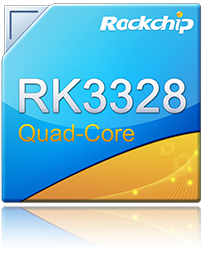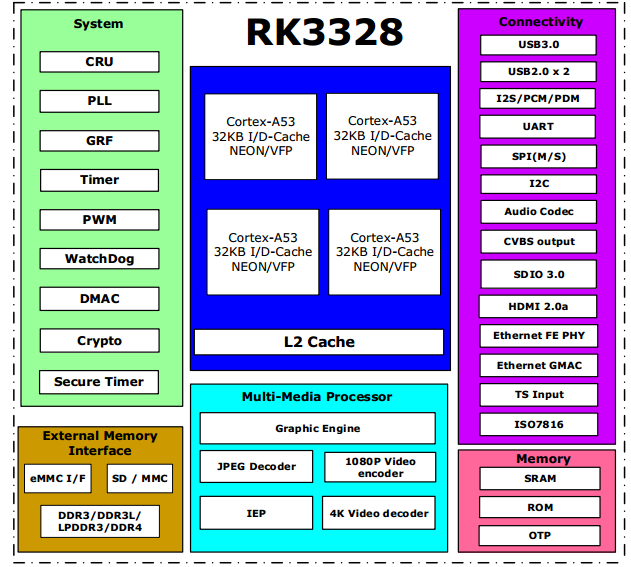|
|
| Line 43: |
Line 43: |
| | | style="width: 530px;" | | | | style="width: 530px;" | |
| | *CPU: | | *CPU: |
| − | **ARM Cortex-A53 Quad-Core | + | **ARM Cortex-A53 Quad-Core |
| | + | **32KB L1 I cache and D cache for each CPU |
| | + | **256KB L2 cache |
| | + | *Internal SRAM |
| | + | **36KB |
| | *GPU | | *GPU |
| | ** Mali-450MP4 | | ** Mali-450MP4 |
| Line 121: |
Line 125: |
| | |} | | |} |
| | | | |
| − | == How to get the sources ==
| + | See [[Linux_user_guide]] setup LInux OS generally; |
| | | | |
| − | The rockchip linux SDK source tree is located in multi Git repository hosted by Github. The SDK uses repo to sync down source code. Beside the generic community Linux support, we have chip optimized Linux SDK and it's also opensource and can get source from github.
| + | See [[U-Boot]] guide to develop U-Boot; |
| | | | |
| − | RK3399 optimized Debian & Buildroot
| + | See [[Rockchip_Kernel|Rockchip kernel]] or [[Upstream_Kernel|Upstream kernel]] to develop kernel; |
| − | <pre>repo init -u https://github.com/rockchip-linux/manifests https://github.com/rockchip-linux/manifests -m rk3399.xml
| |
| − | repo sync
| |
| − | </pre>
| |
| | | | |
| − | == How to build the sources ==
| + | See [[Distribution]] to develop and custimize OS. |
| − | | |
| − | === Build Environment ===
| |
| − | | |
| − | You need a 64-bit Ubuntu. Note: old versions Ubuntu maybe have compatibility issues.<br/> Use below commands to install Ubuntu packages:<br/> $ sudo apt-get install git gnupg flex bison gperf build-essential \<br/> zip tar curl libc6-dev libncurses5-dev:i386 x11proto-core-dev \<br/> libx11-dev:i386 libreadline6-dev:i386 libgl1-mesa-glx:i386 \<br/> libgl1-mesa-dev g++-multilib mingw32 cmake tofrodos \<br/> python-markdown libxml2-utils xsltproc zlib1g-dev:i386 lzop<br/> $ sudo ln -s /usr/lib/i386-linux-gnu/mesa/libGL.so.1 /usr/lib/i386-linux-gn<br/> u/libGL.so
| |
| − | | |
| − | Install ARM cross-compile tool chain and compile kernel relative software package:
| |
| − | | |
| − | $ sudo apt-get install gcc-arm-linux-gnueabihf gcc-aarch64-linux-gnu device-tree-compiler lzop libncurses5-dev libssl1.0.0 libssl-dev
| |
| − | | |
| − | === Installing the build tools and download source ===
| |
| − | | |
| − | Please follow [http://rockchip.wikidot.com/linux-user-guide linux user guide] to install the build tools and download source.
| |
| − | | |
| − |
| |
| − | | |
| − |
| |
| − | | |
| − | === Building kernel ===
| |
| − | | |
| − | empty
| |
| − | | |
| − | === Building uboot ===
| |
| − | | |
| − | empty
| |
| − | | |
| − | === Building rootfs ===
| |
| − | | |
| − | ==== Debian ====
| |
| − | | |
| − | You can download the prebuilt image directly.
| |
| − | | |
| − | [http://pan.baidu.com/s/1eSE1tfW Baidu Pan]、[https://drive.google.com/folderview?id=0BwAJtUrQohwXdGRVYTAwdlJDOUU&usp=sharing Google Drive] | |
| − | | |
| − | or you could use the [https://github.com/rockchip-linux/rk-rootfs-build rootfs-build-script] from Rockchip to build rootfs yourselves.
| |
| − | | |
| − | ==== Yocto ====
| |
| − | | |
| − | If you want to use Yocto to build your rootfs see [http://rockchip.wikidot.com/yocto-user-guide yocto-user-guide] for detail.
| |
| − | | |
| − | ==== Buildroot ====
| |
| − | | |
| − | If you want to use Buildroot to build your rootfs see [http://rockchip.wikidot.com/buildroot-user-guide buildroot-user-guide] for detail.
| |
| − | | |
| − | = Devices =
| |
| − | | |
| − | If you need the rk3399-excavator board, please communicate through the following contact information.
| |
| − | <pre>Telephone: 4007700590 Email: service@rock-chips.com</pre>
| |
| − | | |
| − |
| |
| | | | |
| | = See also = | | = See also = |
Revision as of 15:39, 17 March 2017
| RK3328 |
|---|
 |
| Manufacturer |
Rockcihp |
|---|
| Process |
28nm |
|---|
| CPU |
Quad-Core ARM Cortex-A53 |
|---|
| Memory |
DDR3/DDR3L/LPDDR3/DDR4 |
|---|
| GPU |
Mali-450MP4 |
|---|
| VPU |
4K VP9 and 4K 10bits H265/H264 video decode, up to 60fps |
|---|
| Connectivity |
|---|
| Video |
HDMI 2.0a, |
|---|
| Audio |
8 channels I2S/PDM |
|---|
| Storage |
4x SD Card, eMMC |
|---|
| USB |
1* USB2.0 otg, 1* USB 2.0 Host, 1* USB 3.0 Host |
|---|
| Release Date |
December 2016 |
|---|
| Website |
Product Page
|
|---|
Overview
RK3328 offers a high-integration and power efficiency SOC for 4K HDR OTT/IPTV. It support HDR10 ,HLG HDR , 4K 10bits 30fps H.264 video decoder and 4K 10bits 60fps H265 video decoder.Comply with lots of high-performance interface,such as multi-channel display with HDMI2.0a, TV Encoder, the Quad-core GPU can acheive high-resolution display and game.
Cortex-A53
Quad-core Cortex-A53 is integrated with separate Neon and FPU coprocessor, also with shared L2 Cache.
RK3328 SoC Features
- CPU:
- ARM Cortex-A53 Quad-Core
- 32KB L1 I cache and D cache for each CPU
- 256KB L2 cache
- Internal SRAM
- GPU
- Mali-450MP4
- Comply with Open GL ES1.1/2.0
- Multi-Media:
- 4K VP9 and 4K 10bits H265/H264 video decode, up to 60fps
- 1080P other video decoders (VC-1, MPEG-1/2/4, VP8)
- 1080P video encoder for H.264 and H.265
- Support HDR10 ,HLG HDR , Support conversion between SDR and HDR
- Display:
- HDMI 2.0a for 4K@60Hz with HDCP 1.4/2.2
- Support conversion between Rec.2020 and Rec.709
- Memory:
- LPDDR3/DDR3/DDR3L/DDR4
- eMMC 4.51,SDCard, SPI Flash
- External interface
- USB 2.0 x2 and USB 3.0 x1
- 100M Ethernet w/ built-in PHY
- Built-in CVBS and audio DAC
- 8 channels I2S IO and 8 chanel digital PDM input (for MIC array)
|

|
Documentation
- RK_DDR_Support_List_Ver2.24
- Rk3328_box_ref_v10_20170224
- Rockchip_RK3328_Datasheet_V1.1-20170309
Software
Borad configuration
| board
|
kernel
|
uboot
|
dts
|
| RK_EVB_RK3228H_BOX_RK805_DDR3
|
rockchip_linux_defconfig
|
rk3328_linux_defconfig
|
rk3328r-linux.dts
|
Chip configuration
| chip
|
Kernel eMMC index
|
Kernel SD index
|
Uboot eMMC index
|
Uboot SD index
|
Baud speed
|
| RK3399
|
1
|
0
|
0
|
1
|
1500000
|
See Linux_user_guide setup LInux OS generally;
See U-Boot guide to develop U-Boot;
See Rockchip kernel or Upstream kernel to develop kernel;
See Distribution to develop and custimize OS.
See also
RK3288
RK3399
References
1.https://en.wikipedia.org/wiki/ARM_Cortex-A53



